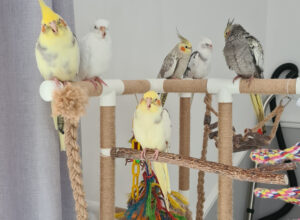understanding cockatiel behaviour
Key Takeaways
- Cockatiel Personality: Discover the unique and endearing traits of cockatiels.
- Communication Cues: Learn to interpret their vocalisations and body language.
- Common Behaviours: Understand typical behaviours and what they signify.
- Health and Happiness: Recognise signs of good health and contentment.
- Problematic Behaviours: Identify and address potential behavioural issues.
Introduction
As a cockatiel owner and enthusiast, I’ve spent years observing and interacting with these charming birds. Cockatiels, native to Australia, are not only popular pets in the UK but also fascinating creatures with a range of behaviours that can tell us a lot about their mood, health, and needs. This article aims to provide a comprehensive guide to understanding cockatiel behaviour, offering insights for both new and experienced owners. For those just starting, it’s crucial to understand the essential cockatiel care basics.
Cockatiel Personality Traits
Cockatiels are known for their affectionate and sociable nature. They often form strong bonds with their owners and can be quite expressive. To create a comfortable environment for them, learn about setting up a cockatiel cage.
Common Personality Traits of Cockatiels
| Trait | Description |
|---|---|
| Playful | Enjoy interactive toys and games. |
| Affectionate | Seek attention and enjoy being petted. |
| Intelligent | Capable of learning tricks and mimicking sounds. |
| Social | Prefer company, either human or another bird. |
Understanding Vocalisations
Cockatiels communicate through a variety of sounds. Each sound can have different meanings based on context. For more on this, explore the basics of cockatiel communication.
Cockatiel Vocalisations and Their Meanings
| Vocalisation | Likely Meaning |
|---|---|
| Whistling | Contentment or seeking attention. |
| Hissing | Fear or aggression. |
| Chirping | General communication or happiness. |
| Screaming | Distress, boredom, or illness. |
Body Language Signs
Observing a cockatiel’s body language provides invaluable insights into their emotional state. Understanding these cues is part of daily cockatiel care.
- Crest Position: A raised crest can indicate curiosity or excitement, while a flattened crest might signal fear or aggression.
- Feather Fluffing: Often a sign of relaxation, but can also indicate illness.
- Tail Wagging: Similar to dogs, this can indicate happiness.
- Wing Flapping: Could be a form of exercise, excitement, or a way to get your attention.
Common Behaviours and Their Significance
Cockatiels display a range of behaviours that can tell us a lot about their mood and health. It’s important to provide them with cockatiel exercise and play opportunities to maintain their well-being.
- Regurgitation: This is often a sign of affection, especially towards their favourite humans. Not to be confused with vomiting which is a sign of illness.
- Beak Grinding: A content and relaxed bird often grinds its beak before sleeping.
- Biting: Can be a sign of fear, discomfort, or territoriality.
Signs of a Healthy and Happy Cockatiel
A healthy cockatiel is usually active, alert, and sociable. Look for the following signs:
- Bright, clear eyes.
- Clean, smooth feathers.
- Regular eating and preening habits.
- Active vocalisations and movements.
For more on maintaining their well-being, consider cockatiel grooming essentials and cockatiel sunlight care.
Addressing Problematic Behaviours
Sometimes, cockatiels may develop behaviours that indicate stress or health issues. Understanding these signs is crucial for identifying cockatiel illnesses.
- Feather Plucking: Often a sign of stress, boredom, or illness.
- Aggression: Can be due to hormonal changes, fear, or lack of socialisation.
- Lethargy: Usually a sign of illness or depression.
Quotes from Experts
“Cockatiels are social creatures that thrive on interaction and mental stimulation.” – Dr. Jane Smith, Avian Veterinarian
“Understanding your cockatiel’s body language is key to building a strong bond.” – Michael Johnson, Experienced Cockatiel Breeder
Conclusion
Understanding cockatiel behaviour is essential for creating a nurturing environment for these delightful birds. By paying attention to their vocalisations, body language, and common behaviours, we can ensure their health and happiness. Remember, each cockatiel is unique, and part of the joy is learning and adapting to your feathered friend’s specific personality and needs. For further reading, explore topics like cockatiel veterinary care and managing cockatiel noises to enhance your understanding and care for your cockatiel.


Good evening Sir/Madam, I hope you can help me. My cockatiel, almost certain she is a female. She was found on a beach trying to drink the salt water & the seagulls were attacking her, she was picked up by a kind person, & to cut a long story short, I ended up with her. So she is a tough little bird. I love her dearly, but because of her rough beginning I think I have over-spoilt her. Apart from seed (changed twice a week), water gets changed daily, she gets a piece of carrot, celery, seed block, vegies & a small piece of toast daily. She has toys in her cage. Her cage gets cleaned out daily, she gets some form of exercise outside the cage daily, I give her personal attention as often as possible (eg: bouncing on my knee, having a chat with my sock, races on floor), she even has her own bedroom for sleeping (away from TV noise etc). But…my boyfriend…he wears hearing aids. Noogie..my cockatiel, gets noisy sometimes, scrisling (spelling?), a cross between a whistle & a scream, sometimes non-stop. I don’t know what to do. Putting her back in her bedroom & covering her up quietens her down, then I will bring her back out & it starts again…so back into the bedroom. I cannot keep doing that, she needs to see what is going on & it upsets me, not to mention the boyfriend. Would it be hormones? When do the females go on heat? I don’t know how old she is, although I have an idea that she would have been only very young when found on the beach, I have had her for about 5years now, she hasn’t been as vocal as this in previous years. Have I over-done it?
Hi! Wow what a story your little one has had, how lucky to be rescued by someone so caring! A couple of tips if I may, I hope you don’t mind? You may want to change her seed every day. Often the husks of the seeds sit on top of the fresh seed, so by giving her less but changing it every day, will make sure she always has a supply of fresh seed. Great job with the veggies! The toast, it’s ok to give them full grain / brown bread but occasionally. It is quite high in sugar so best used as a treat.
It may well be that you have a male? Particularly if the whistles are a tune and she/he takes a liking to your feet? My boy loves my feet and socks, a little too much during hormonal times. It could well be a hormonal period, it is that time of year. Mine are a little crazy right now too.
It could be that she has bonded to you, and is shouting at you for attention. Depending on your circumstances, you may consider getting them a friend? Just be careful of getting the same gender bird if you don’t want babies.
There are some things you can do to tone down hormones. Some suggestions include keeping them covered for longer at night and frequently changing her cage around – toy, perch and food placement.
Sounds like your tiel is enjoying a lovely life!